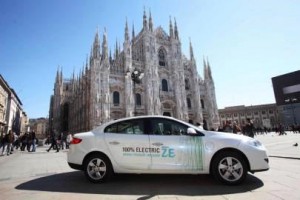The Renault-Nissan Alliance and Italian utility company A2A today announced and agreement to bring electric cars to Lombardy.
This formalizes a memorandum of understanding signed in 2009.
The pilot project, called “E-Moving,” is said to be the first electric vehicle experiment in Italy. It will start in June 2010 in the cities of Milan and Brescia, and is scheduled to run for one year.
The idea is to test the components of the electric mobility model designed in partnership by Renault and A2A.
Tests will focus on:
- technology and distribution of charging infrastructures
- commercial processes and sales and rentals for electric
- vehicles
- interaction between the charging network and the vehicles
- electricity supply for the vehicles and associated invoicing systems
- battery management
- electric vehicle maintenance
As part of this project, consumers and businesses will be able to test the first 60 “zero-emission” Renault vehicles to arrive in Italy. The two models included in the test will be: Kangoo Express Z.E., a light utility vehicle for business use, and Renault Fluence Z.E., a family sedan for both private and professional use.
During the pilot phase, both electric vehicles will be available for a monthly rental fee comparable to that of a diesel car of the same size and performance. (Click Here for Renault Reveals Electric Vehicle Lineup.)
The two cities in the Lombardy region will be the first in Italy to provide a complete charging infrastructure with 270 charging outlets for electric vehicles.
Milan in particular and Lombardy in general are said to be perfect testing grounds for the electric vehicles, given the support for “sustainable development” by the government in a region with high levels of pollution.
At a press conference today, Jacques Bouquet, Managing Director of Renault Italy, and Giuliano Zuccoli, Chairman of the Managing Board of A2A, officially finalized the agreement. A2A is one of the largest companies in Italy.
After the initial test period, a larger scale deployment is envisioned.
“The objective for Renault is to promote sustainable mobility for all, by making electric vehicles available to and affordable for the greatest number. As a result, these vehicles will no longer be a niche product, but a mass-market product,” claimed Bouquet.
Renault is counting on heavy taxpayer subsidies to make EVs viable on much larger scale than currently possible given cost and range and infrastructure challenges. One hotly debated issue – optimistic industry forecasts versus actual customer demand with or without huge incentives – could result in a huge taxpayer-funded boondoggle if expensive, range limited EVs are spurned by potential buyers.
“The multi-utility “A2A is investing in tests on electric mobility as the first step forward in the development of a dense charging infrastructure. The aim is to develop a “point-to-point” network across the main cities of Lombardy as part of an approach to encourage sustainable development and limit pollutant emissions,” said Zuccoli.
Renault SA reported a net loss of €3.1 billion ($4.3 billion) in 2009, compared with a €571 million profit a year earlier — its first annual loss in 13 years, as the global Great Recession exacted it toll in spite of drastic cost cutting of -17% compared to 2008. Revenue fell 11% to €33.7 billion.
The French automaker posted a €396 million-euro operating loss, excluding one-time items, compared with a profit of €326 million in 2009. The operating loss at the auto division increased to a breathtaking -€915 million from €174 million. It was the first loss since the formerly government-owned automaker was privatized.

